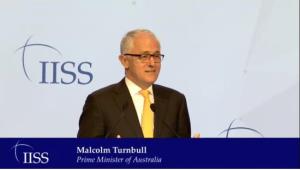
|
| 晚宴现场(官网视频截图) |
You saw that the US-anchored rules-based order - the remarkable system where nations big and small agree to play by the rules and respect each other’s sovereignty - could not be taken for granted here in the Indo Pacific.
Unlike the North Atlantic, there was nowhere in this region where regional defence leaders and strategists could convene and talk frankly about latent security tensions that are now palpable on the Korean Peninsula, in the East and South China Seas and further afield.
You chose Singapore to host this Dialogue for the obvious reason that this nation has been at the very heart of regional strategic policy thinking since its Independence in 1965.
Prime Minister, your father and your nation’s, Lee Kuan Yew, keenly understood that strategic stability does not just happen by itself. In 1966 when Singapore was but a year old and Britain was beginning to consider its withdrawal of military forces “east of Suez” he spoke about the strategic environment and cited the old Chinese saying “Big fish eat small fish and small fish eat shrimps.”
Lee Kuan Yew discussed how the shrimp, as he modestly described his new nation, would survive. It could make itself unpalatable to the larger fish - by being self-reliant and strong. And it could make friends with other larger fish - strong alliances and collective security. He recognised then, as his son and successor as Prime Minister does today, that we all have a vested interest in each other’s security - that it is peace and stability which have formed the essential foundation for the remarkable advances in prosperity and freedom in our region above all.
Lee Kuan Yew’s message was not confined to the binary categories of stability and military conquest. He was speaking at a time of insurgency and foreign sponsored subversion - not a world away from the challenges of our time.
As he told this forum in 2009, he devoted his life to creating the “political and economic space” that was necessary to preserve “the freedom to be ourselves”.
For the shrimp, the little fish and even the middle-to-large sized fish represented here today, we face more than a Manichean choice between life and death, war and peace. The more salient question - even when the risk of war remains remote - is what kind of peace can we maintain?
|

